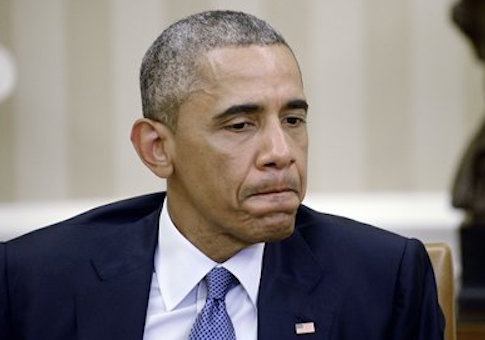The Obama administration’s effort to eliminate red tape added $16 billion in regulatory costs, according to a new report by the American Action Forum obtained by the Washington Free Beacon.
"President Obama signed executive orders (13,563 and 13,610) as part of an effort to ‘eliminate red tape.’ Federal agencies were told to ‘modify, streamline expand, or repeal’ existing regulations," according to the report released by AAF, a center-right nonprofit led by Douglas Holtz-Eakin, former director of the Congressional Budget Office.
The American Action Forum has found the reviews consist mostly of recycled regulations by federal agencies that have actually increased regulatory costs.
"The recent ‘retrospective reports’ from the administration reveal that executive agencies have added more than $16 billion in regulatory costs, up from $14.7 billion in the previous update, and 6.5 million paperwork hours," the report said.
The agency reviews are a result of President Barack Obama’s initiative for a "government-wide review of rules on the books," which the White House claims to have led to $28 billion in net five-year savings since 2011.
However, the American Action Forum has found retrospective reviews often add additional costs to the economy. A review in 2014 added $23 billion in costs and 8.9 million paperwork burden hours.
"Too often for this administration, regulations are regularly expanded and rarely repealed or modified," the organization said.
The most recent review listed 409 rules, up from last year, with agencies averaging 20 regulations apiece. The rules increased net costs by over $16.4 billion, with only two agencies reducing costs. One silver lining of the report was the Department of Transportation, which eliminated $847 million in costs and more than 21 million hours of paperwork.
Regulations from the Department of Health and Human Services were far and away the most costly, including Obamacare regulations and a proposed rule entitled the "Protection of Human Subjects" that would cost $13.3 million while saving only $2.7 million.
"Once again, HHS is the runaway leader by imposing $16 billion in net costs and more than 25 million paperwork burden hours," the report said. "The agency is, amazingly, responsible for 101 percent of the net cost increase, due to cost-cutting measures from other agencies."
The report also found the number of hours needed to comply with federal regulation rose by 6.5 million.
The American Action Forum said the result of the regulatory reviews have not had the results the administration intended.
"Current Harvard law professor and former regulatory czar, Cass Sunstein, wanted to instill a ‘consistent culture of retrospective review’ when he helped to advance the president’s executive orders," the report said. "Looking at the number of new initiatives in the retrospective reviews reveals that many agencies simply ‘cut and paste’ from their previous work."
The report found that the "vast majority" of agencies recycle regulations they have used for past reviews. Eighty-five percent of regulations listed in the most recent review had been used before.
The Department of Agriculture recycled 93 percent of its old rules; the Department of Energy 95 percent; Health and Human Services 95 percent; the Environmental Protection Agency 96 percent; and Veterans Affairs recycled a full 100 percent, and reviewed no new regulations.
"The administration might defend this record, noting that rulemakings can take many years to complete," the report said. "True, but some agencies aren’t proposing any new initiatives and the average agency report contains just 3.8 novel regulatory reforms."
"With all of the problems at the Department of Veterans Affairs, it couldn’t manage to develop a single new reform initiative?"
The American Action Forum concluded the retrospective review initiative is "little more than an attempt to promote additional regulation under the veil of ‘eliminating red tape.’"
